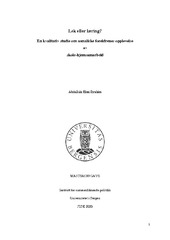| dc.contributor.author | Ibrahim, Abdullahi Elmi | |
| dc.date.accessioned | 2020-08-29T05:33:00Z | |
| dc.date.available | 2020-08-29T05:33:00Z | |
| dc.date.issued | 2020-08-29 | |
| dc.date.submitted | 2020-08-28T22:00:12Z | |
| dc.identifier.uri | https://hdl.handle.net/1956/23917 | |
| dc.description.abstract | Sammendrag Dette er en masteroppgave om demokratibygging ved Universitet i Bergen. Den er en kvalitativ undersøkelse av somaliske foreldres perspektiv på skole-hjem samarbeid. Problemstillingen er: Hvordan opplever somaliske foreldre skole-hjem samarbeidet og hvilke erfaringer sitter de med igjen etter samarbeidet? Målsettingen er å finne ut hvordan somaliske foreldre opplever samarbeidet med skolen og hvordan de engasjerer seg i dette samarbeidet. Videre er hensikten å finne ut hvilke utfordringer foreldre står ovenfor i møte med skolen, og hvordan man håndterer disse utfordringene. Undersøkelsen er basert på kvalitative intervjuer, nærmere bestemt et gruppeintervju bestående av 7 informanter. Jeg mener at gruppeintervju er en egnet forskningsmetode for denne oppgaven fordi det gir meg mulighet til å skape diskusjon mellom foreldrene hvor de har anledning til både å diskutere og til å utveksle erfaringer. Det ble in fin anledning til å gå i dybden av tematikken og gi foreldrene muligheter til å kunne dele sine opplevelser. Datamaterialet ble tolket ut fra foreliggende teorier blant annet om indre og ytre vilkår, fremsatt av Ingrid Bø, deltakelsesmodellen av Sherry Arnstein, Thomas Nordahls typer og samarbeidsnivåer i samarbeidet og om makt og kapital av den franske filosofen Pierre Bourdieu. Oppgaven har følgende funn: ➢ Samarbeidet mellom somaliske foreldre og skolen fremstår som vilkårlige ➢ Samarbeidet mellom somaliske foreldre og skolen synes basert på kontaktløst samarbeid ➢ Språklige og kulturelle barrierer hindrer et godt samarbeid mellom somaliske foreldre og skolen ➢ Somaliske foreldre satser høyt på barnas opplæring, men er misfornøyde med skole/utdanningssystemet i Norge ➢ Språk og utdanningsnivå påvirker samarbeidet, jo bedre språkkompetanse desto bedre samarbeid ➢ Somaliske foreldre mangler foreldremedvirkning og medbestemmelse ➢ Foreldre foretrekker og er fornøyde med å samarbeid bare med lærere ➢ Studien indikerer at skolen ikke tilstrekkelig prioriterer foreldreinkludering og at samarbeidet begrenser seg til et informasjonsnivå 5 ➢ Somalisk foreldre opplever at det er lite faglig fokus og progresjon og at dette ikke oppfyller foreldrenes forventinger ➢ Sosioøkonomisk situasjon, yrkesstatus/samfunnsengasjement, nettverk og utdanning er viktige vilkår som påvirker foreldrenes samarbeid med skolen | en_US |
| dc.description.abstract | Summary This is a master's thesis on democracy-building at the University of Bergen and it is a qualitative study of Somali parents' perspective on school-home collaboration. The topic of the thesis is: How do Somali parents experience the school-home collaboration and what experiences do they have left with after the collaboration? The goal is to find out how Somali parents experience collaboration with the school and how they engage in this. Furthermore, the purpose is to find out what challenges parents face in dealing with the school, and how do they deal with these challenges. The study is based on qualitative interviews, more specifically a group interview consisting of 7 informants. I believe that group interview is a suitable research method for this assignment because it allows me to create a discussion between the parents, where they can both discuss and exchange experiences. It was a great opportunity to go deeper into the theme and allow the parents to share their experiences. The data was interpreted from current theories, including on internal and external conditions, presented by Ingrid Bø, Sherry Arnstein's participation model, Thomas Nordahl's types and levels of collaboration, and power and capital by the French philosopher Pierre Bourdieu. The thesis has the following findings: ➢ The cooperation between Somali parents and the school appear arbitrary ➢ Cooperation between Somali parents and the school seems to be based on contactless cooperation ➢ Linguistic and cultural barriers prevent good cooperation between Somali parents and the school ➢ Somali parents focus heavily on children's education but are dissatisfied with the school/education system in Norway ➢ Language and level of education affect collaboration, the better the language skills, the better the cooperation. ➢ Somali parents lack parental involvement and co-determination ➢ Parents prefer and are happy to collaborate only with teachers ➢ The study indicates that the school does not adequately prioritize parental inclusion and that collaboration is limited to an information level 7 ➢ Somali parents feel that there is little academic focus and progression and that this does not meet their expectations ➢ The socioeconomic situation, occupational status/community involvement, networking and education are important conditions that affect parents' cooperation with the school | en_US |
| dc.language.iso | nob | |
| dc.publisher | The University of Bergen | |
| dc.rights | Copyright the Author. All rights reserved | |
| dc.title | Lek eller læring? En kvalitativ studie om somaliske foreldrenes opplevelse av skole-hjemsamarbeid | |
| dc.type | Master thesis | en_US |
| dc.date.updated | 2020-08-28T22:00:12Z | |
| dc.rights.holder | Copyright the Author. All rights reserved | en_US |
| dc.description.degree | Masteroppgave i demokratibygging | |
| dc.description.localcode | SAMPOL650 | |
| dc.description.localcode | VIDSVMP00 | |
| dc.description.localcode | VIDSVHG | |
| dc.description.localcode | MASV-DEMOK | |
| dc.subject.nus | 731112 | |
| fs.subjectcode | SAMPOL650 | |
| fs.unitcode | 15-13-0 | |
